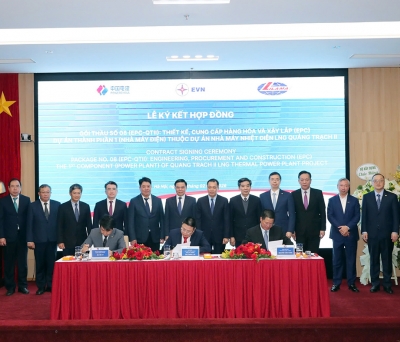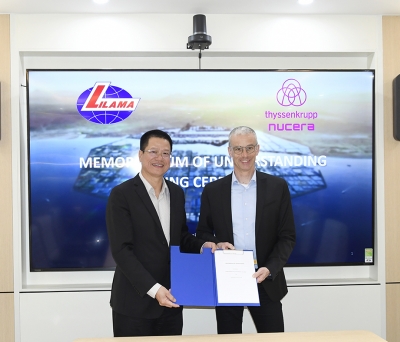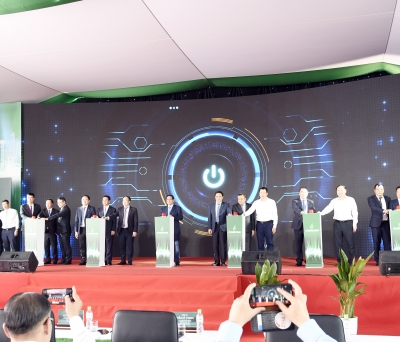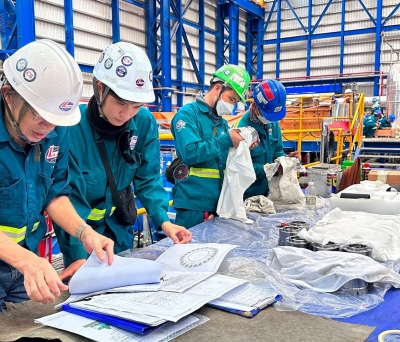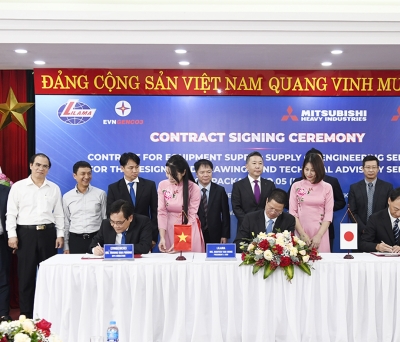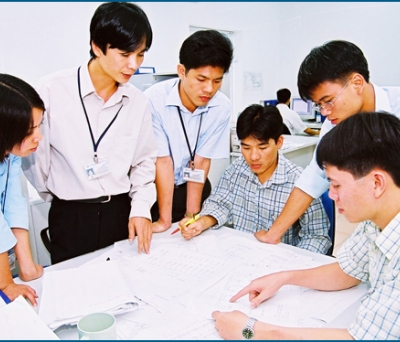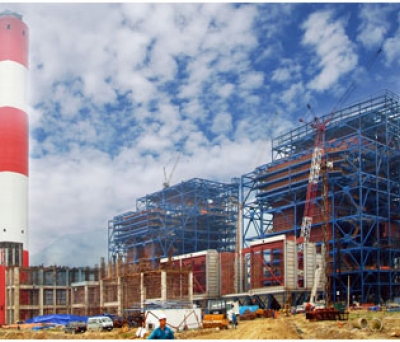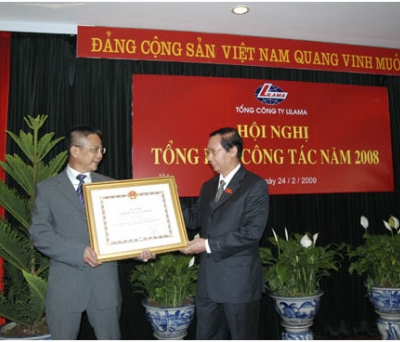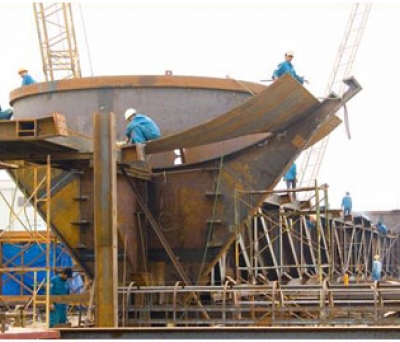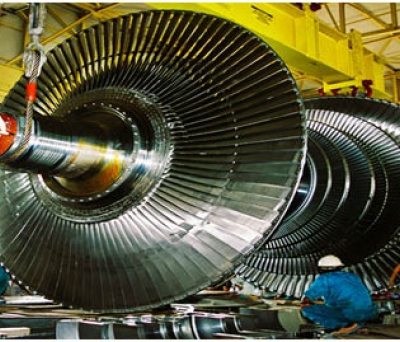Developing mechanics worthily - Last Instalment: Policy Lever
When mechanical enterprises have specified their targets, kinds of product to develop, favourable policies and resources should be concentrated on this focus and the most important things are completion, stableness, long term. If all these can be done, mechanical branch will have more chances and conditions to develop stably, firmly, avoiding spread and ineffectiveness as in recent time.

Awaiting for complete policies
To invest in mechanics, we need big capital source, long-term loan interest whereas profit of mechanical branch is not so high. That is why it is very difficult for most of mechanical enterprises to approach capital sources generally, not including other favourabe capitals even their products belong to the programmes enjoying policies supported by the Government. As for complete mechanical projects or products, if enterprises want to mortgage them to the bank, it is not easy. Moreover, all mechanical businesses have low legal capitals, their productions depend on loans from banks. So, many enterprises not only in mechanical branch wish the banks enhanced the capability to assess of credit organizations and the ability to appraise markets so as to have suitable loan programmes for development of mechanics, one of “spine” branches of the economy.
We can see that there have been policies for mechanical development already but they lack of stability and long term. Over many years developing, mechanical branch is now still “plodding” and and easy to hurt, especially in this integration period today. VAMI Chairman Nguyen Van Thu proposes some following solutions. First, the Government sould continue to implement Decision No.10/QĐ-TTg of Prime Minister on support mechanism to develop manufacturing main important mechanical products until its invalidity with reference to ideas from enterprises in order to set up a new list of main important mechanical products instead of 8 groups of products as before. Second, the Government and Ministry of Industry and Trade are suggested to consider and apply preferential policies to develop industrial branches supporting the whole mechanical one because developing Vietnamese mechanics to modernization is to develop deep specialization, mechanical businesses have to expand their cooperations and operate with mutual assistance, reinforcing the link among them. Third, regarding organization matter, previously we had a Ministry of Mechanics and Metallurgy to be “responsible” for the branch, but now we only have an organ equivalent to a Department of MOIT and surely the management work cannot keep pace with the branch development. Thus, we need establish a specialized management organ for mechanics at bureau level and a General Bureau being directly under MOIT with cadres having experience and deep knowledge about mechanics. Fourth, we should have Steering Committee for main important mechanical products programme and Steering Committee for internalizing mechanism of equipment in thermal power plants according to Decision 1791/QĐ-CP 1791 of the Government because there are many difficulties in its implementation such as: Song Hau 1 thermal power project, Long Phu, Quynh Lap, etc... Some mechanical enterprises have registered and having enough conditions to participate in these projects but unallowable to attend. In addition, much attention should be paid to develop associations.
Intensifying to train manpower source
One of the advantages of Vietnam is the cheap value of employees and population in labour age is very crowded. This is one of the important elements “attracting” orders from foreign countries. For mechanical enterprises, export orders come and go a lot due to many subjective and objective reasons. To be accepted by foreign partners, participate in global value chain, domestic businesses have to try their best continuously. Vice General Director of Lilama 18 JSC Pham Van Van let us know that for the time being approximately 20% of mechanical export of domestic factories belongs to Lilama 18 with the value of about VND400 billion per year. The company has manufactured cranes for Koch (Germany), equipment of cold steel laminating furnace for Danieli (Italy)… They are all famous firms in the world in this field. To be accepted by these partners, Lilama 18 has spent a process of “changing the look” from all production phases to caring for labourers' living standard under supervision of the partners. Although profit from mechanical export is higher than manufacture inside the country, it is still much lower than foreign mechanical companies because Lilama 18 has been paid money per tons of materials only (about USD2–4/kg) whereas others are paid per tons of equipment, i.e there is an intelligent content in the wage and the price is about USD10/kg and above.
There is a situation now that many mechanical businesses misspend their workshops, machineries and equipment whereas some enterprises are not able to "own" these sources. This was the result of a series of wrong policies, a lot of investment outside the branch since many years in the past or the ability to approach markets of those businesses was not so good as the expectation or they met with numerous risks. At the same time, they had no good preparation for the attached sources, which brought about low competition and their orders were very few... On the contrary, if these equipment belonged to other units with stable output, they would be used more effectively. For the time being, to avoid waste of sources which are very limited of the nation, it is high time the State promulgated policies of arranging, transferring sources to achieve the highest effectiveness. According to Lilama General Director Le Van Tuan, if State has the policy to transfer equipment, production lines, workshops for supplement like owners' capitals, it is certainly that enterprises are ready to receive and use them more effectively because they “have the profession” and they assure the output. However, the policies should be clear and obvious so that enterprises can make their production plans proplerly.
To invest in mechanics, we need big capital source, long-term loan interest whereas profit of mechanical branch is not so high. That is why it is very difficult for most of mechanical enterprises to approach capital sources generally, not including other favourabe capitals even their products belong to the programmes enjoying policies supported by the Government. As for complete mechanical projects or products, if enterprises want to mortgage them to the bank, it is not easy. Moreover, all mechanical businesses have low legal capitals, their productions depend on loans from banks. So, many enterprises not only in mechanical branch wish the banks enhanced the capability to assess of credit organizations and the ability to appraise markets so as to have suitable loan programmes for development of mechanics, one of “spine” branches of the economy.
Giving more preferential treatments in bidding to domestic mechanical enterprises
According to Bidding Law in 2015, when Vietnamese owners organize international biddings, domestic enterprises are given preferential treatment of 7.5% more than foreign ones and it is too low as appreciated. That is why the Government is suggested to raise this level to 25% because some countries in the area have policies to support export upto 17% together with some others much more favourable for their export than ours.
Nguyen Van Thu
VAMI Chairman
Xuan Thuy - Duy Tinh


